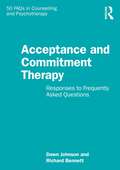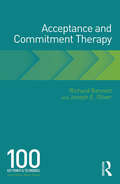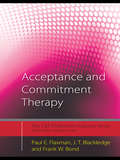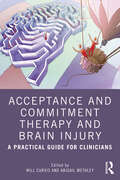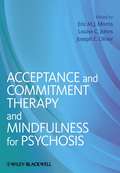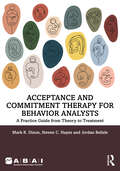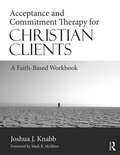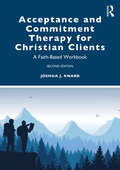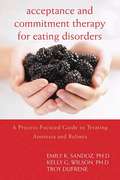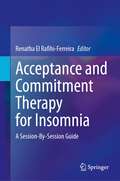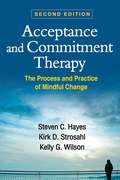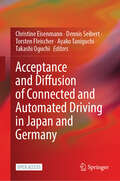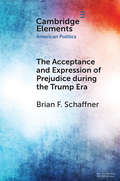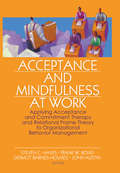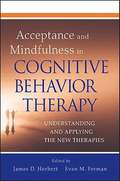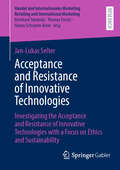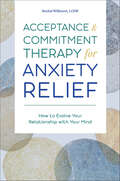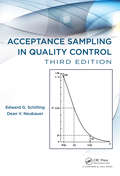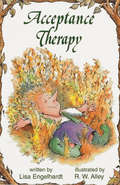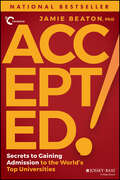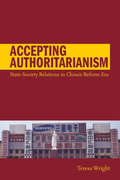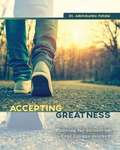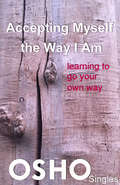- Table View
- List View
Acceptance and Commitment Therapy: Responses to Frequently Asked Questions (50 FAQs in Counselling and Psychotherapy)
by Richard Bennett Dawn JohnsonAcceptance and Commitment Therapy (ACT) is an evidence-based contemporary psychological approach to behaviour change that promotes the idea of people living more in line with their values whilst providing them with practical strategies for managing adversity. In this book, Dawn Johnson and Richard Bennett have collated fifty of the questions that have most frequently been put to them whilst delivering ACT training and supervision to a wide range of therapists and other helping professionals. This book is the first of its kind to provide concise answers to a range of philosophical, theoretical, conceptual, and practical questions raised by practitioners who are learning ACT. It will be of interest to psychotherapists, clinical psychologists, counsellors, psychiatrists, and a broad range of other mental health practitioners and trainees. It serves as a useful resource for those new to the practice of ACT, and for more experienced practitioners who might want to consider these questions themselves.
Acceptance and Commitment Therapy: 100 Key Points and Techniques (100 Key Points)
by Richard Bennett Joe OliverAcceptance and Commitment Therapy: 100 Key Points and Techniques offers a comprehensive, yet concise, overview of the central features of the philosophy, theory, and practical application of ACT. It explains and demonstrates the range of acceptance, mindfulness, and behaviour change strategies that can be used in the service of helping people increase their psychological flexibility and wellbeing. Divided into three main parts, the book covers the ‘Head, Hands, and Heart’ of the approach, moving from the basics of behavioural psychology, via the key principles of Relational Frame Theory and the Psychological Flexibility model, to a detailed description of how ACT is practiced, providing the reader with a solid grounding from which to develop their delivery of ACT-consistent interventions. It concludes by addressing key decisions to make in practice and how best to attend to the therapeutic process. The authors of Acceptance and Commitment Therapy bring a wealth of experience of using ACT in their own therapy practice and of training and supervising others in developing knowledge and skills in the approach. This book will appeal to practitioners looking to further their theoretical knowledge and hands-on skills and those seeking a useful reference for all aspects of their ACT practice.
Acceptance and Commitment Therapy: Distinctive Features (CBT Distinctive Features)
by Paul E. Flaxman J.T. Blackledge Frank W. BondWhat are the distinctive theoretical and practical features of acceptance and commitment therapy? Acceptance and commitment therapy (ACT) is a modern behaviour therapy that uses acceptance and mindfulness interventions alongside commitment and behaviour change strategies to enhance psychological flexibility. Psychological flexibility refers to the ability to contact the present moment and change or persist in behaviour that serves one’s personally chosen values. Divided into two sections, The Distinctive Theoretical Features of ACT and The Distinctive Practical Features of ACT, this book summarises the key features of ACT in 30 concise points and explains how this approach differs from traditional cognitive behaviour therapy. Acceptance and Commitment Therapy provides an excellent guide to ACT. Its straightforward format will appeal to those who are new to the field and provide a handy reference tool for more experienced clinicians.
Acceptance and Commitment Therapy and Brain Injury: A Practical Guide for Clinicians
by Will CurvisAcceptance and Commitment Therapy and Brain Injury discusses how acceptance and commitment therapy (ACT) can be integrated into existing approaches to neuropsychological rehabilitation and therapy used with people who have experienced a brain injury. Written by practicing clinical psychologists and clinical neuropsychologists, this text is the first to integrate available research with innovative clinical practice. The book discusses how ACT principles can be adapted to meet the broad and varying physical, cognitive, emotional and behavioural needs of people who have experienced brain injury, including supporting families of people who have experienced brain injury and healthcare professionals working in brain injury services. It offers considerations for direct and indirect, systemic and multi-disciplinary working through discussion of ACT concepts alongside examples taken from clinical practice and consideration of real-world brain injury cases, across a range of clinical settings and contexts. The book will be relevant to a range of psychologists and related professionals, including those working in neuropsychology settings and those working in more general physical or mental health contexts.
Acceptance and Commitment Therapy and Mindfulness for Psychosis
by Joseph E. Oliver Eric M. Morris Louise C. JohnsThis is the first volume to present a broad picture of theory and application for clinical approaches incorporating ACT and mindfulness in working with psychosis. It provides an overview and introduction to the subject, including a review of the evidence base. Clinical and practical applications are supported with case studies in both individual and group work, with an emphasis on utilizing these strategies in a clinical context. Addressed to practitioners, this book is idea for clinical and counseling psychologists, CBT therapists, and psychiatrists.
Acceptance and Commitment Therapy for Behavior Analysts: A Practice Guide from Theory to Treatment (Behavior Science)
by Mark R. Dixon Steven C. Hayes Jordan BelisleThis book provides a thorough discussion of acceptance and commitment therapy or training (ACT) and a guide for its use by behavior analysts. The book emphasizes how the intentional development of six core behavioral processes – values, committed action, acceptance, defusion, self-as-context, and present moment awareness – help establish the psychological flexibility needed to acquire and maintain adaptive behaviors that compete with maladaptive behavior patterns in verbally able clients. Split into three parts, the book discusses the history and controversy surrounding the rise of acceptance and commitment strategies in behavior analysis and shows how the processes underlying ACT are linked to foundational behavioral scientific principles as amplified by stimulus equivalence and relational learning principles such as those addressed by relational frame theory. In a careful step-by-step way, it describes the best practices for administering the acceptance and commitment procedures at the level of the individual client, organizational systems, and with families. Attention is also given to the ethical and scope-of-practice considerations for behavior analysts, along with recommendations for conducting on-going research on this new frontier for behavior analytic treatment across a myriad of populations and behaviors. Written by leading experts in the field, the book argues that practice must proceed from the basic tenants of behavior analysis, and that now is the opportune moment to bring ACT methods to behavior analysts to maximize the scope and depth of behavioral treatments for all people. Acceptance and Commitment Therapy for Behavior Analysts will be an essential read for students of behavior analysis and behavior therapy, as well as for individuals on graduate training programs that prepare behavior analysts and professionals that are likely to use ACT in their clinical practice and research.
Acceptance and Commitment Therapy for Christian Clients: A Faith-Based Workbook
by Joshua J. KnabbAcceptance and Commitment Therapy for Christian Clients is an indispensable companion to Faith-Based ACT for Christian Clients. The workbook offers a basic overview of the goals of ACT, including concepts that overlap with Christianity. Chapters devoted to each of the six ACT processes include biblical examples, equivalent concepts from the writings of early desert Christians, worksheets for clients to better understand and apply the material, and strategies for clients to integrate a Christian worldview with the ACT-based processes. Each chapter also includes several exercises devoted to contemplative prayer and other psychospiritual interventions.
Acceptance and Commitment Therapy for Christian Clients: A Faith-Based Workbook
by Joshua J. KnabbAcceptance and Commitment Therapy for Christian Clients: A Faith-Based Workbook, Second Edition, is an indispensable companion for mental health professionals and their clients. The new edition includes updated discussions in each chapter and more than twenty-five new and updated exercises. The workbook offers a basic overview of the goals of ACT, including concepts that overlap with Christianity. Chapters devoted to each of the six ACT processes include biblical examples, equivalent concepts from the writings of contemplative Christians, worksheets for clients to better understand and apply the material, and strategies for clients to integrate a Christian worldview with ACT processes. Each chapter also includes several exercises devoted to contemplative practices and other psychospiritual interventions.
Acceptance and Commitment Therapy for Eating Disorders: A Process-focused Guide to Treating Anorexia and Bulimia
by Emily K. Sandoz Kelly G. Wilson Troy DufreneAt some point in clinical practice, most therapists will encounter a client suffering with an eating disorder, but many are uncertain of how to treat these issues. Because eating disorders are rooted in secrecy and reinforced by our culture's dangerous obsession with thinness, sufferers are likely to experience significant health complications before they receive the help they need. Acceptance and Commitment Therapy for Eating Disorders presents a thorough conceptual foundation along with a complete protocol therapists can use to target the rigidity and perfectionism at the core of most eating disorders. Using this protocol, therapists can help clients overcome anorexia, bulimia, binge eating disorder, and other types of disordered eating. This professional guide offers a review of acceptance and commitment therapy (ACT) as a theoretical orientation and presents case conceptualizations that illuminate the ACT process. Then, it provides session-by-session guidance for training and tracking present-moment focus, cognitive defusion, experiential acceptance, transcendent self-awareness, chosen values, and committed action-the six behavioral components that underlie ACT and allow clients to radically change their relationship to food and to their bodies. Both clinicians who already use ACT in their practices and those who have no prior familiarity with this revolutionary approach will find this resource essential to the effective assessment and treatment of all types of eating disorders.
Acceptance and Commitment Therapy for Insomnia: A Session-By-Session Guide
by Renatha El Rafihi-FerreiraThis book presents a complete guide for psychotherapists to apply a protocol based on Acceptance and Commitment Therapy (ACT) to the treatment of insomnia. It describes an evidence-based treatment program for insomnia based on the theoretical model of ACT which allows clinicians to both apply it as monotherapy or in conjunction with behavioral components that are associated with better insomnia treatment outcomes, such as stimulus control and sleep restriction. Cognitive Behavioral Therapy for Insomnia (CBT-I) is the current psychotherapy of choice to treat insomnia, but there are patients who have difficulties in adhering to some therapeutic elements and others who are refractory to this modality. Therefore, new therapeutic modalities are needed. ACT applied to insomnia has shown effective results, presenting another way to deal with the cognitive components involved in sleep difficulties. Acceptance and Commitment Therapy for Insomnia: A Session-By-Session Guide aims to bridge the gap between the available evidence on the use of ACT for insomnia and clinical practice by providing, in one single volume, all the necessary tools for clinical psychologists, psychiatrists, psychotherapists and mental health professionals interested in applying this innovative evidence-based approach to the treatment of insomnia. “This innovative and well-written volume offers therapists a practical, evidence-based alternative to traditional Cognitive Behavioral Therapy or medication-dependent treatments for insomnia. It’s important to have such choices, and Acceptance and Commitment Therapy (ACT) has unusual strengths in focusing on the whole person and their overall quality of life, instead of the features of sleep disruption alone. Using a carefully crafted, session-by-session approach, it equips professionals with the tools to adapt ACT to individual patient needs, making a meaningful difference in their journey towards restful sleep and greater well-being. Highly recommended”. Steven C. Hayes, Ph.D. Foundation Professor of Psychology Emeritus, University of Nevada, Reno. Originator of Acceptance and Commitment Therapy.
Acceptance and Commitment Therapy, Second Edition
by Steven C. Hayes Kirk D. StrosahlSince the original publication of this seminal work, acceptance and commitment therapy (ACT) has come into its own as a widely practiced approach to helping people change. This book provides the definitive statement of ACT--from conceptual and empirical foundations to clinical techniques written by its originators. ACT is based on the idea that psychological rigidity is a root cause of a wide range of clinical problems. The authors describe effective, innovative ways to cultivate psychological flexibility by detecting and targeting six key processes: defusion, acceptance, attention to the present moment, self-awareness, values, and committed action. Sample therapeutic exercises and patient-therapist dialogues are integrated throughout. New to This Edition, Reflects tremendous advances in ACT clinical applications, theory building, and research. Psychological flexibility is now the central organizing focus. Expanded coverage of mindfulness, the therapeutic relationship, relational learning, and case formulation. Restructured to be more clinician friendly and accessible; focuses on the moment-by-moment process of therapy.
Acceptance and Diffusion of Connected and Automated Driving in Japan and Germany
by Christine Eisenmann Dennis Seibert Torsten Fleischer Ayako Taniguchi Takashi OguchiThis open access book gives comprehensive empirical insights on connected and automated driving (CAD) of road transport vehicles which leads to the driver being partially or completely replaced by automation. The current trend towards widespread research and development of automation of motorised individual transport is driven by the expected benefits, such as increased road safety, smoother traffic flow, reduction of congestion, or use of driving time for other activities. CAD has the potential to change several dimensions of the transport system, ranging from changes in car ownership to the availability of entirely new mobility services. Some proponents even expect CAD to revolutionise the current transport system as a whole. In order to make informed statements about the possible impact of CAD on transport systems, research must consider a wide range of open questions: In what way do the existing framework conditions of the prevailing mobility systems affect the impact of CAD? How does the governance style relate to regulatory changes and resource allocation in the development of CAD? Is an autonomous ride-hailing service really a profitable business case? What are the attitudes and expectations towards CAD in the general public? What are the effects of CAD on transport systems? What are other impacts of CAD that should be assessed? All of these questions were addressed within different projects as part of the Japanese-German Research Cooperation on CAD and can be discovered by the reader of this book.
The Acceptance and Expression of Prejudice during the Trump Era (Elements in American Politics)
by Brian F. SchaffnerWhat are the consequences when politicians make prejudiced statements? Theories about the suppression of prejudice argue that people are likely to express more prejudice when they believe that norms are more permissive than they may have otherwise assumed. Using a series of experiments carried out during and since the 2016 campaign, Brian Schaffner shows that being exposed to Donald Trump's prejudiced rhetoric causes people to express more prejudice themselves. Notably, this is not merely a 'Trump Effect;' people's commitment to anti-prejudice norms is undermined even when exposed to prejudiced rhetoric attributed to unnamed politicians. These findings are consequential; if politicians increasingly feel at liberty to express explicit prejudice, then the mass public is likely to take cues from such behavior, leading them to express more prejudice themselves. This may lead to increasingly heightened inter-group tensions which could pose a threat to political and social stability in the United States.
Acceptance and Mindfulness at Work: Applying Acceptance and Commitment Therapy and Relational Frame Theory to Organizational Behavior Management
by Dermot Barnes-Holmes Steven C. Hayes John Austin Frank W. BondAn innovative and effective approach to organizational behavioral management Despite more than 40 years of empirical and conceptual research, the contribution of behavior analysis to the world of business remains relatively small and organizational behavior management gets little attention in both the academic and professional communities. Acceptance and Mindfulness at Work presents behavioral analysis of human language that&’s ready to use, with applied extensions proven to have a significant impact in organizational settings. The leading experts in the field examine how these ongoing developments can help broaden the exploration of the psychological issues relevant to organizational behavioral management (OBM) in the workplace.Acceptance and Mindfulness at Work presents conceptual and empirical articles, and reviews of working examples of Relational Frame Theory (RFT) and Acceptance and Commitment Therapy (ACT) applied to organizational behavior management. The book examines goal setting, feedback, task descriptions, and workers&’ ability to learn as examples of how to affect positive change in organizations through increased productivity and improved quality of life in the workplace. The possibilities presented by RTF can lead to advancements in employee safety and training, stress and health management, employee evaluation, managing absenteeism, tardiness, and turnover, and self-management.Acceptance and Mindfulness at Work examines: cognition in OBM industrial/organization (I/O) psychology how interventions using ACT have increased psychological flexibility rule-following feedback task performance feedback programmed schedules of reinforcement goal setting, goal statements, and goal-directed behavior how psychological flexibility and job control can predict learning, job performance, and mental health and much moreAcceptance and Mindfulness at Work is a vital professional resource for organization development practitioners and human resource managers.
Acceptance and Mindfulness in Cognitive Behavior Therapy
by James D. Herbert Evan M. FormanPraise for Acceptance and Mindfulness in Cognitive Behavior Therapy: Understanding and Applying the New Therapies"One of the most fruitful aspects of the encounter between classical Buddhist knowledge and modern science has been the emergence of new therapeutic and educational approaches that integrate contemplative practice, such as mindfulness, and contemporary psychology methods, such as those of cognitive therapy. The systematic approach of this book, wherein the insights of both classical Buddhist and contemporary psychology are integrated, represents a most beneficial and powerful method of ensuring a healthy mind and heart."--His Holiness the Dalai Lama"What has been missing in the midst of partisan battles between orthodox CBT therapists and enthusiastic proponents of newer acceptance/mindfulness approaches is a reasoned, scientifically grounded discourse that would help researchers and clinicians alike sort through the various claims and counterclaims. This book, skillfully conceived and edited by James Herbert and Evan Forman, provides just such a sober and open-minded appraisal of a trend that has sometimes suffered both from too much hype from one side and too sweeping a rejection by the other. This volume encourages careful consideration of both positions and can advance evidence-based psychosocial therapy both conceptually and procedurally to the benefit of all."--From the Foreword by Gerald C. Davison, PhD, University of Southern CaliforniaAcceptance and Mindfulness in Cognitive Behavior Therapy: Understanding and Applying the New Therapies brings together a renowned group of leading figures in CBT who address key issues and topics, including:Mindfulness-based cognitive therapyMetacognitive therapyMindfulness-based stress reductionDialectical behavior therapyUnderstanding acceptance and commitment therapy in context
Acceptance and Resistance of Innovative Technologies: Investigating the Acceptance and Resistance of Innovative Technologies with a Focus on Ethics and Sustainability (Handel und Internationales Marketing Retailing and International Marketing)
by Jan-Lukas SelterThe book examines the adoption of different innovative technologies and explores the behavioral intention of both consumers and companies of using these technologies. Both determinants of acceptance and resistance of technology are considered by referring to the Unified Theory of Acceptance and Use of Technology and the Innovation Resistance Theory. The six essays in this publication relate to six innovative technologies and approaches. This entails an examination of technologies that either involve ethical challenges or are designed with the objective of achieving (ecological) sustainability.
Acceptance & Commitment Therapy for Anxiety Relief: How to Evolve Your Relationship with Your Mind
by Rachel WillimottFind anxiety relief with Acceptance and Commitment Therapy (ACT) techniquesWhether you've just been diagnosed with an anxiety disorder or you've lived with it for years, you know how pervasive the symptoms can be in your everyday life. Acceptance and Commitment Therapy for Anxiety Relief is filled with scientifically supported methods and strategies for managing your anxiety so you can mindfully accept and take action against your emotions.With a wealth of experience treating anxiety patients using ACT, licensed clinical social worker Rachel Willimott will walk you through the six processes of Acceptance and Commitment Therapy: cognitive defusion, acceptance, contacting the present, the observing self, values, and committed action. For each process, you'll learn the reasoning behind the method, straightforward techniques for practicing it, what others' experiences are like, misconceptions, and mindfulness exercises and journal prompts for anxiety relief.Acceptance and Commitment Therapy for Anxiety Relief includes:Anxiety 101—Learn more about anxiety disorders and the mind-body connection.An intro to ACT—Explore the origins and core concepts of ACT and the benefits of using ACT to manage anxiety.ACT in practice—Read case studies and the real-life experiences of patients using ACT for anxiety relief so you can see it in practice.Take your life back with evidence-based strategies and techniques to help you achieve anxiety relief.
Acceptance Sampling in Quality Control
by Edward Schilling Dean NeubauerAcceptance Sampling in Quality Control, Third Edition presents the state of the art in the methodology of sampling while integrating both theory and best practices. It discusses various standards, including those from the ISO, MIL-STD and ASTM and explores how to set quality levels. The book also includes problems at the end of each chapter with solutions. This edition improves upon the previous editions especially in the areas of software applications and compliance sampling plans. New to the Third Edition: Numerous Microsoft Excel templates to address sampling plans are used. Commercial software applications are discussed at the end of many chapters. Discussion of quick switching systems has been expanded to account for the considerable recent activity in this area. Added discussion of zero acceptance number chained quick switching systems.
Acceptance Therapy
by R. W. Alley Lisa O EngelhardtFor those who have trouble letting go, for those who struggle to reconcile themselves to life's brokeness, here is a delightful, inspiring, liberating guide to spiritual and psychological wellness and serenity!
The Acceptance World: Book 3 Of A Dance Ot The Music Of Time (A Dance of Music and Time)
by Anthony PowellAnthony Powell’s universally acclaimed epic A Dance to the Music of Time offers a matchless panorama of twentieth-century London . Now, for the first time in decades, readers in the United States can read the books of Dance as they were originally published—as twelve individual novels—but with a twenty-first-century twist: they’re available only as e-books. The third volume, The Acceptance World (1955), opens with Nick Jenkins, in his late twenties, beginning to make his way in the world of letters: working for a publisher, writing on his own, and establishing connections across the literary landscape. At the same time, he is making his way in love, as a surprise meeting with an old friend’s sister blossoms into an affair. Meanwhile, friends are diving into marriage and careers, and the patterns of life’s dance are starting to take shape—even as the future steps remain shadowy. "Anthony Powell is the best living English novelist by far. His admirers are addicts, let us face it, held in thrall by a magician."--ChicagoTribune "A book which creates a world and explores it in depth, which ponders changing relationships and values, which creates brilliantly living and diverse characters and then watches them grow and change in their milieu. . . . Powell's world is as large and as complex as Proust's."--Elizabeth Janeway, New YorkTimes "One of the most important works of fiction since the Second World War. . . . The novel looked, as it began, something like a comedy of manners; then, for a while, like a tragedy of manners; now like a vastly entertaining, deeply melancholy, yet somehow courageous statement about human experience."--Naomi Bliven, New Yorker “The most brilliant and penetrating novelist we have.”--Kingsley Amis
Accepted!: Secrets to Gaining Admission to the World's Top Universities
by Jamie BeatonHow do you REALLY get accepted to a top university? Told from the fresh and personal perspective of 26-year-old Crimson Education CEO and Harvard, Stanford, and Oxford graduate Jamie Beaton, Accepted! is an honest and practical guide on beating the odds and getting into Ivy League and other elite schools – the smart way. Beaton takes you behind the doors of the world's top college admissions offices, revealing the highly strategic selection processes applied by institutions whose reputations depend on the number of students they admit, or more pointedly, the tens of thousands that they don't. In Accepted!, Beaton delivers the ultimate insider "how to" and disrupts cliched admissions advice with savvy strategies like: Moneyballing the university rankings and increasing your chances of admission Class spamming your way to academic supremacy and acceptance Playing the early application dating game and understanding how institutions are using it to their reputational advantage Packed with real-life examples from the thousands of students Beaton has helped land a spot at Yale, Oxford, Stanford, and other esteemed global universities, Accepted! is a never-before assembled culmination of secrets, insights, and application strategies guaranteed to maximize your chances of "getting in" to the school of your choice. From ambitious students and their supportive parents to academic advisors and admissions professionals, Accepted! is the must-read guide to demystifying the often-convoluted and increasingly competitive world of elite college admissions.
Accepted
by J. LilleyAndy is Shalean and in love with a human, but has no idea how to make such a relationship work.Sam has no idea that Shalea exists, only that he is fed up waiting for Andy to make the most move. Initially overjoyed to find his feelings reciprocated, Sam soon starts seeing strange things. Something is afoot, and Andy seems right in the middle of it. What Sam discovers rocks him to the core. But he is determined to fight for their chance of happiness. Human he may be, but as long as Andy wants him, they can face anything, can't they?
Accepting Authoritarianism: State-society Relations in China's Reform Era
by Teresa WrightWhy hasn't the emergence of capitalism led China's citizenry to press for liberal democratic change? This book argues that China's combination of state-led development, late industrialization, and socialist legacies have affected popular perceptions of socioeconomic mobility, economic dependence on the state, and political options, giving citizens incentives to perpetuate the political status quo and disincentives to embrace liberal democratic change. Wright addresses the ways in which China's political and economic development shares broader features of state-led late industrialization and post-socialist transformation with countries as diverse as Mexico, India, Tunisia, Indonesia, South Korea, Brazil, Russia, and Vietnam. With its detailed analysis of China's major socioeconomic groups (private entrepreneurs, state sector workers, private sector workers, professionals and students, and farmers),Accepting Authoritarianismis an up-to-date, comprehensive, and coherent text on the evolution of state-society relations in reform-era China.
Accepting Greatness: Planning for Success on Your College Journey
by Adetokunbo FatokeAccepting Greatness Planning for Success on Your College Journey First Edition
Accepting Myself the Way I Am: learning to go your own way
by Osho Osho International FoundationWe have lost touch with who we are and how we want to live. It started at birth. From birth we are molded according to the beliefs and ideals of others, and our own potential is ignored. It needs immense courage to go your own way, leaving the crowd behind. The moment you do it you are taking responsibility for your life in your own hands. Osho reminds us that it is a step worth taking.
